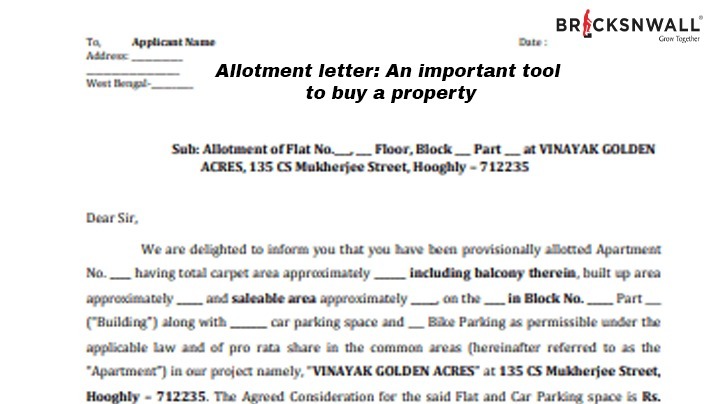Allotment letter: A vital tool to buy a property
Koheli

A government
or other body may grant permission to purchase real estate by issuing an
allotment letter, a legal document. It must be obtained before buying a home
because it is a legally binding document. The buyer's name, the property's
address, the amount of money required, and the deadline for the purchase are
often included in the allotment letter. It also acts as evidence of property
ownership.
A
closer look at what an allotment letter is
When
purchasing a property, an allocation letter is a crucial document. It is an
official document that spells out the contract details between the buyer and
the seller. The property's developer or builder issues the allocation letter
serves as the buyer's evidence of ownership and payment.
An
explanation of an allocation letter's purpose and significance in the property
purchase process is provided below.
Buy
Intention Confirmation: An allocation letter serves as a purchase
intention confirmation for the buyer. It summarises the agreement's specifics,
including a property description, payment plan, and other terms and conditions.
Evidence
of Ownership: The allocation letter, an important document, shows the
property's ownership. The developer or builder creates a formal record with
legal force.
Payment
Schedule: The property's payment plan is described in the allotment letter. It
specifies the sum of the down payment and any additional payments needed. This
makes it possible for the buyer to plan appropriately by ensuring they know the
payment needs.
Terms
and Conditions: The terms and conditions of the agreement between the
buyer and the seller are stated in the allocation letter. This includes
specifics like the date of possession, the change in ownership, and any other
pertinent data about the acquisition of the property.
Legal
Protection: An allocation letter gives the buyer and the seller
legal protection. It guarantees that all parties are aware of the terms and
conditions of the contract and aids in avoiding future misunderstandings or
conflicts.
Required
for loan approval: An allocation letter is frequently required by lenders
as part of the loan acceptance procedure. Getting finance for the property
acquisition could be challenging without this paperwork.
When
purchasing a property, obtaining an allotment letter is essential. It is a
crucial document that stipulates the terms of the agreement between the buyer
and the seller, describes the payment plan, and offers legal protection and
proof of ownership. Before signing, ensure you have thoroughly read and understand
the allotment letter to prevent future problems or disagreements. An allotment
letter, which describes the terms of the sale, is a crucial document when
purchasing real estate. The purchase price, the selling date, and other
information like the payment schedule, the ownership of the property, and any
sale-related restrictions or conditions should all be included. The buyer and
the seller must sign the allotment letter, which should be maintained as proof
of the transaction.
Conclusion
In conclusion, while purchasing a property, an allotment letter is a crucial document that confirms the purchase and proof of ownership. It provides both the buyer and the seller with legal protection and details the contract's payment schedule, terms, and conditions. Before signing, ensure you have thoroughly read and understand the allotment letter to prevent future problems or disagreements. The allotment letter is essential when applying for a bank loan since it specifies how much you must pay the builder or housing society before the bank finances the balance. The bank lends the balance following this letter. Despite the common misconception that the sales agreement is the most crucial document in real estate transactions, the allotment letter is helpful when you are not given what you were promised.




